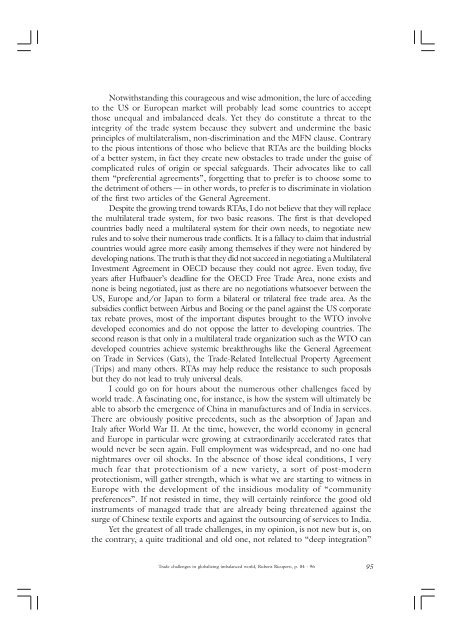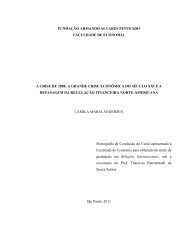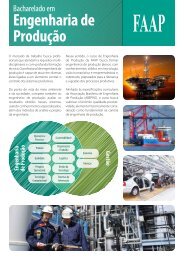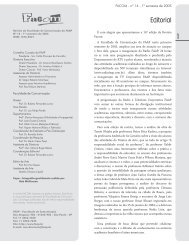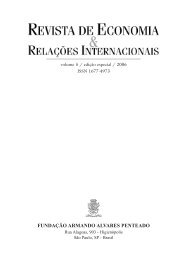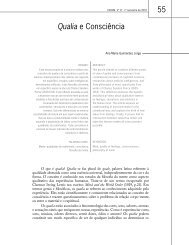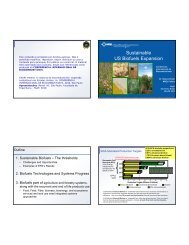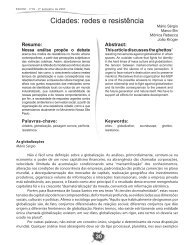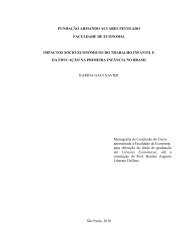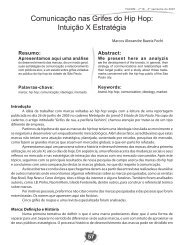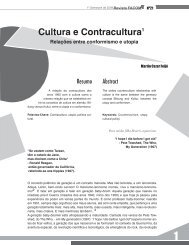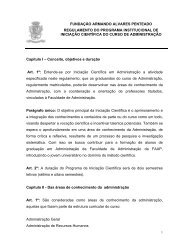Número 8 - Janeiro 2006 - Faap
Número 8 - Janeiro 2006 - Faap
Número 8 - Janeiro 2006 - Faap
You also want an ePaper? Increase the reach of your titles
YUMPU automatically turns print PDFs into web optimized ePapers that Google loves.
Notwithstanding this courageous and wise admonition, the lure of acceding<br />
to the US or European market will probably lead some countries to accept<br />
those unequal and imbalanced deals. Yet they do constitute a threat to the<br />
integrity of the trade system because they subvert and undermine the basic<br />
principles of multilateralism, non-discrimination and the MFN clause. Contrary<br />
to the pious intentions of those who believe that RTAs are the building blocks<br />
of a better system, in fact they create new obstacles to trade under the guise of<br />
complicated rules of origin or special safeguards. Their advocates like to call<br />
them “preferential agreements”, forgetting that to prefer is to choose some to<br />
the detriment of others — in other words, to prefer is to discriminate in violation<br />
of the first two articles of the General Agreement.<br />
Despite the growing trend towards RTAs, I do not believe that they will replace<br />
the multilateral trade system, for two basic reasons. The first is that developed<br />
countries badly need a multilateral system for their own needs, to negotiate new<br />
rules and to solve their numerous trade conflicts. It is a fallacy to claim that industrial<br />
countries would agree more easily among themselves if they were not hindered by<br />
developing nations. The truth is that they did not succeed in negotiating a Multilateral<br />
Investment Agreement in OECD because they could not agree. Even today, five<br />
years after Hufbauer’s deadline for the OECD Free Trade Area, none exists and<br />
none is being negotiated, just as there are no negotiations whatsoever between the<br />
US, Europe and/or Japan to form a bilateral or trilateral free trade area. As the<br />
subsidies conflict between Airbus and Boeing or the panel against the US corporate<br />
tax rebate proves, most of the important disputes brought to the WTO involve<br />
developed economies and do not oppose the latter to developing countries. The<br />
second reason is that only in a multilateral trade organization such as the WTO can<br />
developed countries achieve systemic breakthroughs like the General Agreement<br />
on Trade in Services (Gats), the Trade-Related Intellectual Property Agreement<br />
(Trips) and many others. RTAs may help reduce the resistance to such proposals<br />
but they do not lead to truly universal deals.<br />
I could go on for hours about the numerous other challenges faced by<br />
world trade. A fascinating one, for instance, is how the system will ultimately be<br />
able to absorb the emergence of China in manufactures and of India in services.<br />
There are obviously positive precedents, such as the absorption of Japan and<br />
Italy after World War II. At the time, however, the world economy in general<br />
and Europe in particular were growing at extraordinarily accelerated rates that<br />
would never be seen again. Full employment was widespread, and no one had<br />
nightmares over oil shocks. In the absence of those ideal conditions, I very<br />
much fear that protectionism of a new variety, a sort of post-modern<br />
protectionism, will gather strength, which is what we are starting to witness in<br />
Europe with the development of the insidious modality of “community<br />
preferences”. If not resisted in time, they will certainly reinforce the good old<br />
instruments of managed trade that are already being threatened against the<br />
surge of Chinese textile exports and against the outsourcing of services to India.<br />
Yet the greatest of all trade challenges, in my opinion, is not new but is, on<br />
the contrary, a quite traditional and old one, not related to “deep integration”<br />
Trade challenges in globalizing imbalanced world, Rubens Ricupero, p. 84 - 96<br />
95


